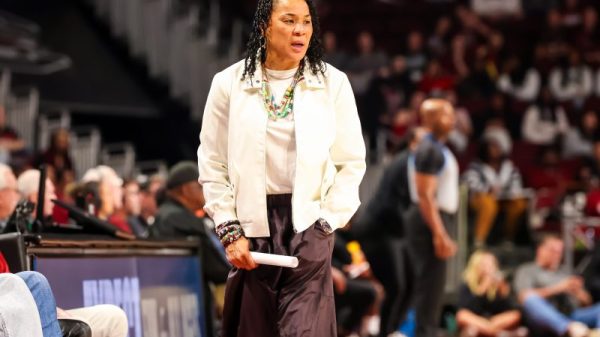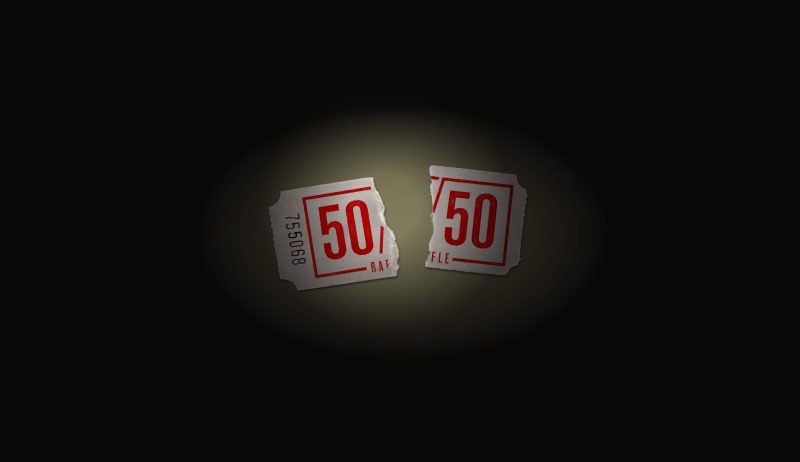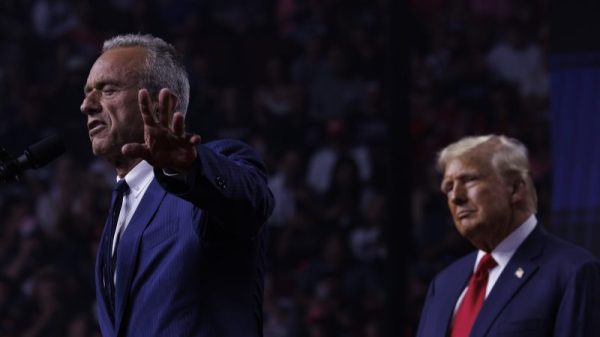DENVER – Nearly 100 nights a year, thousands of dollars in cash poured into a room the size of a broom closet in downtown Denver’s Ball Arena.
Each night, Randy Kanai collected the cash and stashed it in a safe.
The money came from the charity 50/50 raffle held for a decade at Colorado Avalanche, Denver Nuggets, Colorado Mammoth and Colorado Rapids home games. As the state-certified raffle manager, it was Kanai’s job to ensure the money reached its intended recipients.
Half the jackpot went to the winner. The other half was supposed to go to charity – primarily the Colorado Amateur Hockey Association, the nonprofit USA Hockey governing body that regulates the sport in the state. Kanai was its president.
The money could have been used to offset the costs of a notoriously expensive youth sport, in which ice rental, equipment and travel costs routinely exceed $10,000 a year for a single child. But instead of going to the hockey nonprofit and its member teams and leagues, a USA TODAY investigation found that 1 in 3 dollars the raffle raised from late 2016 through 2022 was misspent or remains missing.
More than $300,000 was never deposited into the raffle bank account. Another $275,000 was paid to outside groups with little or no connection to hockey. And $25,000 more was spent on travel and entertainment, including $2,000 plane tickets and season tickets to Nuggets games.
At the same time money was going missing, Kanai made a string of large cash deposits into his private bank account, court records show. Asked to explain them during an April 2025 civil trial – in which he was found liable for stealing money from the hockey association unrelated to the raffle – Kanai said the cash came from bags he found lying around his parents’ house.
“I see exactly why it looks suspicious,” Kanai, who denies all wrongdoing, told USA TODAY. “But I’m telling you, I operated that raffle the best that I could. I did the best job that I could with the resources that I had.”
Kroenke Sports & Entertainment, which owns the National Hockey League, National Basketball Association, National Lacrosse League and Major League Soccer franchises that hosted the raffle at their games from 2013 to 2022, declined to answer specific questions about the raffle from USA TODAY. Its nonprofit arm, Kroenke Sports Charities, received a portion of the proceeds.
‘We have been disappointed and saddened to learn what CAHA and its members have had to endure through this process,” Kroenke Sports & Entertainment communications director Jim Mulvihill said in an emailed statement.
“The raffles in question were overseen by the former CAHA president who was the subject of the underlying litigation. All raffle proceeds received by Kroenke Sports Charities were fully distributed to our nonprofit charitable partners.’
To track the raffle money, USA TODAY obtained and analyzed more than 3,000 pages of the Colorado Amateur Hockey Association’s bank statements, check images, tax returns, emails, court filings and quarterly reports to the Colorado Secretary of State detailing its raffle activity. The news organization spoke to dozens of hockey parents, raffle volunteers, state officials, attorneys and two accountants who signed off on the methodology.
The investigation reveals how Kanai skirted the state’s charitable gaming laws for years while shortchanging the hockey families whose interests he was supposed to serve. It also raises the question of why the entities that oversee the nonprofit’s finances – the Colorado Secretary of State and USA Hockey – both failed to notice.
State launches investigation
The Colorado Amateur Hockey Association ran the raffle from 2013 to 2022 under a license from the Colorado Secretary of State, which regulates charitable gaming.
A week after receiving detailed questions from USA TODAY about Kanai’s management of the raffle, the Secretary of State’s office on Oct. 23, 2025, launched an investigation into the Colorado Amateur Hockey Association’s “past operating practices.”
“It is illegal to submit false information regarding charitable gaming activities to this office,” deputy communications director Kailee Stiles said in an emailed statement to USA TODAY.
“The Department takes its enforcement role seriously, reviews submitted information to ensure compliance with Colorado law, and investigates failure to comply with the law whenever it has the basis and evidence to do so.”
The Colorado Amateur Hockey Association will fully cooperate with the state’s investigation, Tom McGann, the nonprofit’s current president, told USA TODAY.
“Mr. Kanai has a demonstrated lack of transparency with both USA Hockey and former CAHA Boards of Directors,” McGann said. “Similarly, his information sharing on the 50/50 Raffle which he operated was less than transparent.”
Bill Brierly, the association’s executive vice president, encouraged county and state prosecutors to investigate its former president’s handling of the raffle, too.
“If what you’ve found is true, then this is money that was diverted from CAHA that should have been used to make hockey more affordable and provide other opportunities for youth and amateur hockey players in Colorado,” Brierly said.
“It’s just not a proper way to be running a nonprofit.”
Stacks of raffle cash
When the 50/50 raffle started in 2013, it was clear where the money was flowing.
But within four years, money started to disappear.
The idea for the raffle originated with Kanai.
A hockey parent whose kids played in Colorado’s youth leagues, Kanai in 2009 co-founded a Tier I hockey club – the top level of youth competition. Three years later, he was elected Colorado Amateur Hockey Association president.
Kanai approached Kroenke Sports & Entertainment with the idea soon after he took office, he later testified in court. Under their partnership, the hockey nonprofit would run the raffle and share the proceeds with Kroenke Sports Charities, the company’s nonprofit arm.
The two organizations worked closely with the Secretary of State’s office to make sure they complied with state laws, according to a July 2013 report on the agency’s website. The office touted the partnership as a resounding success.
Kroenke Sports Charities’ portion of the money would fund sports programs for underserved children, the report said. The hockey association’s share would go to local hockey teams and leagues and help improve its SafeSport program for protecting young athletes from abuse.
With more than 100 home games a year among the four pro teams, the raffle quickly grew into one of the state’s biggest charitable gaming operations. Fans bought hundreds of thousands of dollars’ worth of raffle tickets each year. Some swiped credit cards. Many paid cash.
Roughly once every two weeks during the pro teams’ 2016-17 seasons, Kanai took stacks of raffle cash out of the safe in the arena and brought them to one of two KeyBank branches within five miles of his house in Wheat Ridge, Colorado, bank records show.
There, he deposited the cash into the hockey nonprofit’s segregated raffle bank account, where state law required it to store all raffle revenue. It was from that account that the nonprofit paid the winners, charities and other raffle expenses.
Practically every penny was accounted for in bank statements that year. But the next year, a gap started to appear between the amount the raffle recorded making and the amount Kanai deposited.
The gap grew for five years – and never closed.
The raffle sold at least $1.8 million in tickets from October 2016 through the last one in June 2022, according to quarterly reports Kanai submitted to the state and jackpot results on the official raffle website.
But less than $1.5 million was deposited into the raffle bank account during that time, bank statements show – a $300,000 shortfall.
Kanai told USA TODAY he was unaware of the gap. Almost every game, $100 or $200 would go missing, he said, but he never calculated the total amount lost over the 351 raffles in question. He suggested that the volunteer ticket sellers could have pocketed cash, that it could have fallen out of their aprons, or that they did not turn in raffle tickets printed in error that should have been voided.
Kanai said he did not always count the money after each game. Sometimes, he let it sit in the arena safe for weeks before reconciling the receipts against sales.
“Since I’m there every single night, I didn’t want to hang out there longer than I needed to, so I’d just gather up all the cash and credit card receipts and throw it in a safe and walk out the door without counting it,” he said. “I didn’t reconcile every night. I didn’t have the staff to reconcile.”
Kanai later added that he sometimes posted inflated jackpot amounts on the scoreboard at games to boost ticket sales, which he said could cause the online jackpot results to be inaccurate. Still, it does not explain the $300,000 gap between the deposits and revenue figures he reported to the state, which he affirmed under penalty of perjury were true and correct.
Nonprofit officers have a fiduciary duty to be good stewards of their organizations’ resources, said Laurie Styron, the executive director of CharityWatch, a nonprofit that rates and investigates other nonprofits. If Kanai didn’t have the resources to manage the raffle properly, he shouldn’t have run it.
“This is just another example of someone running a nonprofit as if it’s their personal proprietorship,” Styron said. “If you want to risk your own money, that’s your own business.
“But this is not his personal money. This is the charity’s money.”
Hockey orgs received a fraction of the money
In the raffle’s first few months, the Colorado Amateur Hockey Association gave its entire share of the proceeds to its member teams and leagues.
But by 2017, it stopped giving to its members almost entirely.
Kroenke Sports Charities continued to get its share. But Kanai gave most of the hockey association’s cut to a handful of youth baseball, softball and collegiate club sports teams.
For years, Kanai enlisted those outside groups to sell raffle tickets at games in exchange for a roughly 15% cut of the jackpot. As a result, $277,000 intended for hockey families was instead paid to non-member organizations with little or no connection to the association’s mission of regulating and growing the sport.
Paying groups to staff raffles is illegal under Colorado laws and the state constitution, said Stiles, the Secretary of State spokesperson. Only “bona fide members” of a licensed nonprofit can volunteer to work games. No person or organization can receive compensation for working. The entire net proceeds must be “exclusively devoted” to the nonprofit’s lawful charitable purpose.
Twice in the last five years, Colorado voters rejected ballot measures that would have amended the constitution to let nonprofits pay raffle workers. Opponents argued that the measures would have diverted money away from nonprofits’ core missions and made charitable gaming more like “for-profit gambling.”
By signing each of the Colorado Amateur Hockey Association’s annual raffle license renewal applications, Kanai repeatedly affirmed under penalty of perjury that he read, understood and was responsible for following Colorado’s raffle laws. Yet over and over, he continued paying organizations to sell tickets.
The University of Denver and University of Northern Colorado club sports departments each got $47,000 in raffle funds for working games from October 2016 through 2022, quarterly reports, bank statements and check images show. Another $57,000 went to three youth travel softball teams. No one organization received more – $55,000 – than Centennial Panthers Elite Youth Baseball, a nonprofit with no website and one officer, according to its tax filings: a treasurer.
Most of the Panthers’ entire budget in 2016 came from the 50/50 raffle, its tax filing that year shows. It spent most of it on a weeklong, summer baseball camp and tournament at Cooperstown Dreams Park, in the same upstate New York town as the National Baseball Hall of Fame.
Kanai does not deny paying outside groups to staff the raffle. He told USA TODAY he did so to keep the raffle alive because hockey teams refused to volunteer. The Secretary of State’s office, he said, knew and approved of his practice of giving these groups “donations” in exchange for selling tickets.
“I don’t ever recall sitting down and actually reading all the state raffle laws,” Kanai said. “I was operating under the belief that the state knew what I was doing, and if I was outside of the raffle law, they would let me know. And that never happened.”
Stiles declined to answer specific questions about the Colorado Amateur Hockey Association, including whether the Secretary of State’s office knew of the arrangement. But the investigation notice the office sent the nonprofit on Oct. 23, 2025, ordered it to preserve all records on, among other things, “remuneration.”
“Colorado law and the state constitution prohibit direct remuneration to individuals or groups for volunteering to run charitable games,” Stiles said. “Department staff regularly communicate with operators of charitable games to ensure that the legal and constitutional requirements are abundantly clear.”
Kanai insisted that he kept the raffle going for the Colorado hockey community’s benefit. Based on its contract with Kroenke Sports & Entertainment, roughly a third of the net proceeds should have gone to the hockey nonprofit and its members.
In fact, those hockey organizations got just 7% – $124,000.
“That’s $124,000 that they would not have had otherwise,” Kanai told USA TODAY. “Had there been no raffle, there would have been nothing.”
Raffle irregularities go undetected
The 50/50 raffle came to a near total halt in March 2020, when the COVID-19 pandemic shut down in-person events across the country.
The Colorado Amateur Hockey Association held a few online-only raffles through June 2022, when they ended. By then, the people charged with overseeing its finances had ample reason to question Kanai’s practices.
In 2018 and 2019, Kanai made a series of unusual purchases from the raffle bank account that don’t appear to fall within the narrow list of expenses permitted under the state’s raffle laws, such as advertising, equipment and accounting fees.
He spent $9,000 on airfare, hotels and ground transportation for three separate business trips in 10 months, which he logged in quarterly reports as “vendor meetings.” On one trip, he bought two plane tickets for $2,130 each.
Kanai also made $16,000 worth of purchases at an online ticket seller for Avalanche and Nuggets games and other events. He listed them in quarterly reports as donations, describing one $5,460 transaction as “Nuggets season tickets for donations to charitable causes,” without specifying what.
The trips were for training hosted by the association’s raffle software vendor, Kanai told USA TODAY. Some of the ticket purchases were for game tickets given out as jackpot prizes, he said, while others were for golf tournaments and galas hosted by Kroenke Sports Charities.
He said he did not recall what charitable causes the Nuggets tickets benefited or why the plane tickets were so expensive. He later said Nuggets tickets were given to volunteer ticket sellers as incentives for working games.
The Colorado Secretary of State’s six-person bingo-raffle team is responsible for reviewing 500-plus nonprofits’ charitable gaming reports each quarter for inconsistencies, discrepancies and missing information, Stiles said.
The team, however, did not flag the Colorado Amateur Hockey Association’s high-dollar travel and entertainment expenses, hundreds of “donations” to outside groups that helped sell tickets, or the missing $300,000. Nor did it notice that the nonprofit’s reported revenue and expenses and its raffle bank account statements, which were attached to each report, almost never matched.
Stiles declined to say whether the bingo-raffle team’s review processes should have flagged the issues. The team did not receive any complaints about the hockey nonprofit or have any independent reason to audit or investigate its legal compliance, she said, until USA TODAY raised the issues in October.
The only enforcement action the state agency took against the nonprofit, she said, was issuing a Class 3 violation in 2014 for failing to keep copies of raffle tickets. The Colorado Amateur Hockey Association paid a $50 fine.
No one on the hockey nonprofit’s board seemed to notice the issues, either. That includes its longtime treasurer and secretary, Shawn Tanaka, who filed its tax returns each year, had access to the raffle bank account and received $20,000 annually from the association’s main operating budget for “professional services.”
Tanaka, who no longer serves on the board, did not respond to phone, text and email messages from USA TODAY seeking comment.
USA Hockey – recognized by federal law as the sport’s national governing body – is supposed to conduct site reviews of each of its 34 affiliates’ finances every three years. Despite reviewing tax filings as part of the reviews, USA Hockey does not appear to have noticed that the Colorado Amateur Hockey Association’s tax filings, bank statements and quarterly reports all showed widely different charitable gaming revenue figures.
USA Hockey spokesperson Dave Fischer did not respond to multiple requests for comment for this story.
It wasn’t a regulator who finally noticed the discrepancies. It was a local hockey mom.
Concerned about conflicts of interests involving Kanai and other board members, Brooke Wilfley, who runs a hockey academy in Denver, personally hired an accounting firm in late 2022 to examine the association’s finances. The firm’s January 2023 report found six-figure differences between its bank statements and internal books, “questionable raffle activity,” and financial records it called “illogical.”
Only after receiving that report – and a whistleblower retaliation complaint from Wilfley – did USA Hockey hire an accounting firm of its own to forensically audit the association’s finances.
USA Hockey’s accounting firm ordered Kanai to turn over numerous documents about both his private business and the raffle.
Kanai refused to provide them.
Wilfley said she is grateful to USA Hockey for intervening and supporting her. But she said there needs to be a better system for rooting out bad actors in a youth sport where, across the country, businesses and individuals are exploiting families for profit.
“Families give up everything for their kids to play, and these programs take advantage of them,” she said. “Thousands of kids in our state are being impacted by the decisions that these people are making. And nobody’s doing anything.”
‘Cash in bags, just sitting around the house’
Randy Kanai took the witness stand in Courtroom 550 of Jefferson County District Court, swearing to tell the whole truth and nothing but it.
It was April 1, 2025 – his day in court to defend himself against allegations that he had stolen at least $180,000 from the hockey nonprofit he ran for over a decade.
The Colorado Amateur Hockey Association filed a lawsuit against Kanai in October 2023, five months after the board voted him out of office. The lawsuit accused him of funneling the association’s money through his private business. Although it wasn’t one of the main charges, it also accused him of failing to keep adequate records on the raffle.
At the civil trial, Thomas Krysa, an attorney representing the association, questioned Kanai about a string of large cash deposits into his personal bank account in 2020 and 2021 – specifically, whether the cash came from the 50/50 raffle.
Kanai said it did not. The money, he testified under oath, came from bags of cash he found lying around his parents’ house after they died in 1997.
“That was all cash that I was pulling from stuff that they had laying around,” Kanai said.
“I’m confused,” Krysa said. “So your parents had a lot of cash in bags just sitting around the house?”
“Yeah.”
Reading from Kanai’s bank statements, Krysa rattled off 10 of the cash deposits:
$4,000 on July 20, 2020.
$4,000 on August 25, 2020.
$3,960 on September 24, 2020.
$4,000 on October 22, 2020.
$4,000 on November 18, 2020.
$4,000 on December 18, 2020.
$4,000 on January 20, 2021.
$4,000 on February 24, 2021.
$2,000 on March 17, 2021.
$4,300 on May 11, 2021.
“It’s not cash from the 50/50 raffle, right?”
“No.”
“Why were you depositing $4,000 at a time?”
“It was just an easy way, the way my parents had the cash bundled.”
Krysa asked if Kanai knew that banks must file currency transaction reports to the U.S. Department of the Treasury’s Financial Crimes Enforcement Network when they process cash transactions exceeding $10,000.
Kanai said he was aware.
“Were you trying to avoid that?”
“No,” Kanai said. “If I would’ve been trying to avoid that, I would’ve put in $9,900.”
Why wait 23 years to deposit the money?
Kanai said he and his siblings put all the money into a safe in one of their houses, “forgot about it, and just left it there.”
“You forgot?”
“Oh, we knew it was there, but there was no urgency to do anything with it.”
“You didn’t want to earn interest on it?”
“We were earning interest in other places, and nobody wanted to sit there and take the time to deposit that.’
“How much cash did you have in that safe at one time?”
“I don’t know,” Kanai said. “Two, $300,000.”
Six months after the trial, Judge Chantel Contiguglia issued her written verdict. It found Kanai liable for civil theft, unjust enrichment, conversion of funds and breach of fiduciary duty.
Contiguglia ordered Kanai to pay the nonprofit $579,000 – three times the amount he stole, with interest – plus attorney fees, and turn over all his documents related to the nonprofit and its finances. The 47-page judgment, which centered on Kanai’s private business, did not mention the raffle.
Kanai told USA TODAY he planned to appeal. He was disappointed with the ruling, he said, but will “sleep good every night knowing the truth.”
That the cash he found in his parents’ house is about the same amount missing from the raffle fund, he said, is a “total coincidence.”
“I’ll swear on a stack of bibles,” he said. “That’s not raffle cash.”
Some of the money, he said, still sits in his personal safe.
Kenny Jacoby is an investigative reporter for USA TODAY who covers college and youth sports. Email him at kjacoby@usatoday.com.




























